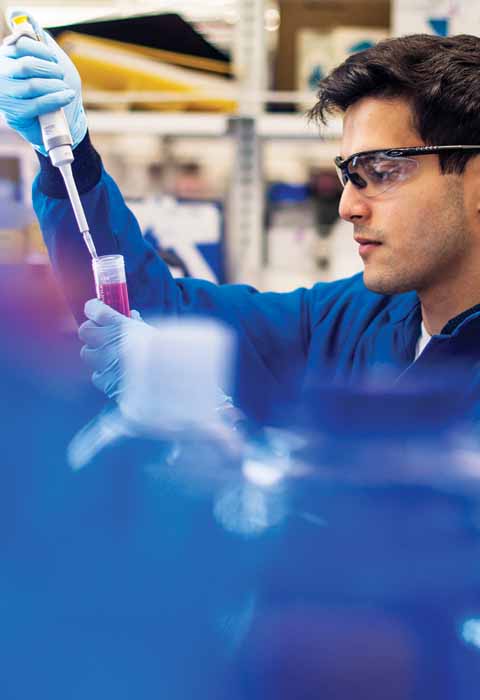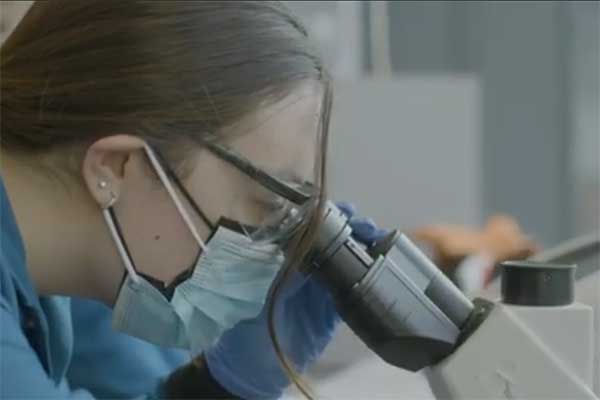
Bachelor of Science in Bioengineering
Bachelor of Science in Bioengineering
Overview
Bioengineering is engineering in a biological context such as the human body, an ecosystem, or a bioreactor. In every case, the interface between engineered and biological systems places unique constraints on the design and implementation of devices, instruments, or implants. These depend on the properties of the biological system involved and the functionality that is being created.
Innovative Curriculum
The interface of engineering and medicine as embodied in bioengineering will be one of the most exciting endeavors and greatest adventures of the 21st century. Job opportunities are expected to expand dramatically with a focus on development of entirely new classes of products, instrumentation, and implants. The impact to human health will be extraordinary.
Bioengineering is intrinsically multidisciplinary and it is essential that students learn the languages used by multidisciplinary teams. To that end, our curriculum is structured around a core of six courses that analyze biological systems from every possible quantitative point of view. On the completion of the core, students choose one of four concentrations, which provides the opportunity to develop a deep level of expertise in a specific area of bioengineering.
Bioengineering students will have unique opportunities in the classroom, research labs, and experiential learning. The projects that they may be able to contribute to include bio-bandages that monitor bacterial growth or that help damaged ligaments heal faster; sheets of cells folded like origami to form a working kidney; and new materials that—like a leaf in the sun—automatically sense and adapt to changes in the environment.
PlusOne Accelerated Master’s Degree
The PlusOne Accelerated Master’s Program allows current undergraduate students to accelerate the attainment of the master’s degree by applying graduate credits taken as an undergraduate toward both the undergraduate and graduate degrees. Current students apply to enroll in the PlusOne program. Students attain their bachelor’s degree followed by a PlusOne year to complete the master’s degree.
Students currently earning a BS in Bioengineering can select from the below MS degree PlusOne pathways.
Concentrations
Our undergraduate program includes four research concentrations, including:
View Molecular, Cell, and Tissue Engineering Curriculum Requirements
View description of the Systems, Synthetic, and Computational Bioengineering Concentration.
View Systems, Synthetic, and Computational Bioengineering Curriculum Requirements
Experiential Learning
Experiential learning is the heart of a Northeastern education, combining rigorous coursework with hands-on experience in the classroom, in the lab, and in the field—locally and abroad. With our signature cooperative education (co-op) program, students typically gain six months of work experience integrated as part of the educational program. Both five-year, three-co-op and four-year, two-co-op program options are available.
Academic Advising
For support with academic questions, contact the academic advisor assigned to this program.
Admissions & Aid
Ready to take the next step? Review Degree Requirements to see courses needed to complete this degree. Then, explore ways to pay for your education. Finally, review Admissions Information to see our deadlines and gather the materials you need to Apply.
Student News

Achievements and Impact with Aashna Mahurkar
Aashna Mahurkar, BS’26, bioengineering, explores her passion for service and interest in medical devices throughout her studies at Northeastern. Recently, Mahurkar and her team won first place in the Fall 2025 Capstone Cup for bioengineering.

Bioengineering Students Develop Innovative Prosthetic for Para-Athlete
A group of bioengineering undergraduate students came together for their capstone project to develop a custom prosthetic foot and ankle for a para-athlete.

From Young Scholars Program to Full-Time Student
While in high school, Dmitra Mukasa, E’28, bioengineering, participated in the Young scholars’ program offered by Northeastern. There, she learned about Northeastern’s impactful research and vast array of career opportunities available to its students, sparking her interest in attending the school. Now, in her second year of undergraduate studies, Mukasa has found a degree path that encapsulates all her interests and aspirations, making her excited to continue the journey.

Integrating Data Analytics and Bioengineering to Enhance Lives
Isabella Ribeiro, E’25, bioengineering, MS’26, data analytics engineering, has always appreciated the analytical thinking and critical thinking skills that come with studying engineering. Her second co-op experience showed her how the analytical and critical thinking skills she values could be applied in the biotech industry, where she’s now passionate about using data and computation to enhance quality of life.
Professional Licensure: If looking for information on obtaining Professional Licensure, visit the Professional Licensure Disclosure Page or contact the Associate Dean for Undergraduate Education, Susan Freeman, at s.freeman@northeastern.edu.
